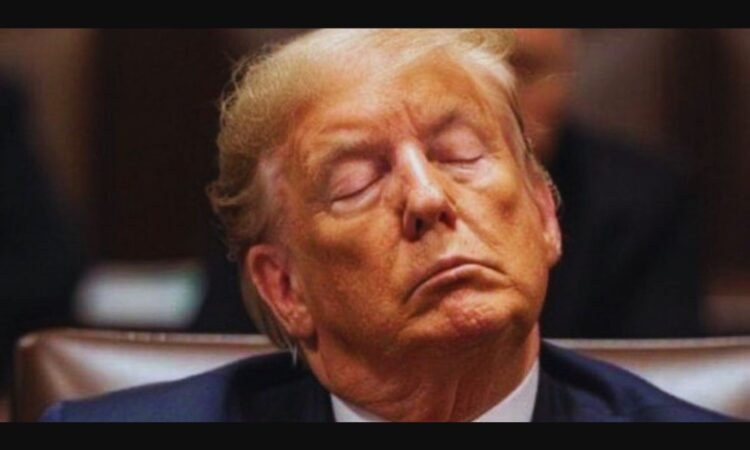Donald Trump’s Cognitive Decline Is Getting Hard for MAGA Loyalists To Ignore Due to This Sign

For months, Trump tried to stop the release of FBI documents connected to Jeffrey Epstein, who was once his associate. Then he suddenly changed direction. On Truth Social, he said that House Republicans should vote to release the Epstein files. On the surface, this made him look open and transparent, as if he had nothing to hide. But Salon writer Amanda Marcotte claims that, behind the scenes, Trump and Attorney General Pam Bondi are actually trying to slow things down or limit what the public will see.
Trump has told Republicans not to “talk about it too much,” and he keeps saying that the whole scandal is really a problem for Democrats. He has also pushed conspiracy-style ideas, suggesting that any damaging information about him has been invented or twisted by his enemies. Instead of sounding calm and confident, he often comes across as nervous and defensive. That, in turn, makes people wonder what he is so worried about, and whether there is something serious in those files that could hurt him or people close to him.
The mood in Congress has changed as well. Not long ago, refusing to discuss the Epstein files was almost a sign of loyalty to Trump. It showed that you were “with him” no matter what. But this week, nearly all House Republicans joined with Democrats to demand that the documents be released. According to reporting from The Washington Post, this vote is part of a bigger shift: more conservatives are now willing to push back against Trump on various issues, including the economy and immigration, not just Epstein.
Marcotte argues that one big reason for this change is growing unease about Trump’s health. She admits that some people on the left may be guilty of wishful thinking, hoping that Trump’s health issues will push him out of politics sooner. But she also says there is enough public evidence to genuinely worry people. At 79 years old, the president often does not look or act like he is doing well, and even some die-hard MAGA supporters are finding it harder to pretend nothing is wrong.
In recent months, more and more stories have appeared about Trump’s physical condition. People have noticed bruises on his hands, swelling, and moments where he seems unsteady. There have also been reports of him dozing off during televised events, looking tired and unfocused while cameras are rolling. A mysterious MRI scan that Trump has refused to explain has only added to the questions. Every time he avoids details or brushes off questions, the speculation increases.
These health worries are happening at the same time as other problems. Trump has suffered political setbacks, his poll numbers have dipped, and the Epstein file controversy has made him look less in control than before. When you put all of this together—his behavior, his age, the rumors, the secrecy around his medical tests—it creates an image of a leader who is worn down and mentally exhausted rather than strong and energetic.
The White House keeps insisting that Trump is in “excellent health.” Official spokespeople deny there is anything seriously wrong with him. But these repeated denials have not stopped the public from talking. In fact, the more the White House says “everything is fine,” the more some people feel they are not being told the full truth. A few long-time supporters have quietly started to admit that he does not seem as sharp or as present as he once was. This is a big change from earlier years, when Republicans almost always united around him and rarely criticized him in public.
Trump, for his part, has tried to show strength and confidence with big symbolic moves. He has worked on building a new ballroom at the White House and has been seen handing out “Trump 2028” hats, as if he is already preparing for another run that would go beyond the legal two-term limit for U.S. presidents. He has hinted at the idea of a third term even though it would be unconstitutional, using the talk as a way to show that he believes his movement is bigger than the normal rules. These gestures are supposed to project power and energy, but for some people they do the opposite—they look like desperate attempts to hold onto relevance.
Even within the Republican Party, there are clear signs that some leaders are thinking about a future without Trump. GOP Representative Thomas Massie, who played a key role in forcing the Epstein files vote onto the House floor, sent a very blunt warning to his colleagues. He said, “In 2030, he’s not going to be the president.” This was not just a comment about age or term limits. It was also a message that the party needs to stop acting like Trump will be at the center of everything forever.
Meanwhile, rumors about Trump’s health continue to swirl online. At one point in the fall, a strange and false claim went viral, saying that he had died over Labor Day weekend. That rumor was completely untrue, but the fact that so many people took it seriously shows how ready some are to believe that something might be very wrong. His frequent stumbles, visible slips, and unexplained medical checks have made it easier for these kinds of stories to spread quickly.
In the end, the article suggests that the combination of the Epstein file controversy, Trump’s confused and shifting responses, visible signs of aging, and ongoing health rumors are all slowly weakening his image—even among some of his own base. MAGA loyalists once brushed off any criticism as “fake news” or “deep state lies.” Now, with cameras catching him dozing off, his body language looking less steady, his political grip loosening, and Republicans in Congress increasingly willing to defy him, it’s becoming harder for them to pretend everything is normal. Even if they still support him, they cannot completely ignore the growing questions about whether he is physically and mentally strong enough to keep leading for much longer.




